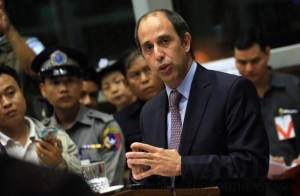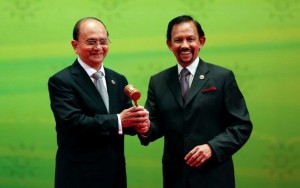Posts Tagged ‘United Nations General Assembly Resolution’ (18 found)
Myanmar: National report submitted in accordance with paragraph 5 of the annex to Human Rights Council resolution 16/21
1. During the First Cycle of UPR, the promotion and protection of human rights in Myanmar was reviewed on 27 January 2011 at the meeting of the Working Group on UPR […]
• • •Myanmar: UN Human Rights Expert Commends Reforms to Date, but Warns of Risks of Backtracking
NEW YORK / GENEVA (29 October 2014) – The new United Nations Special Rapporteur on the human rights situation in Myanmar, Yanghee Lee, commended the process of reform that has improved the political, economic social and human rights landscape over the past three years, but said that “more is required if gains are to be genuine, sustainable and win the support of the people of Myanmar.” […]
• • •Myanmar: UNGA Resolution Must Address Backtracking on Human Rights
As the new UN Special Rapporteur on the situation of human rights in Myanmar, Yanghee Lee, today presents her first report to the 69thsession of the UN General Assembly (UNGA), Amnesty International calls on the UNGA to adopt a resolution on the country which addresses the government’s backtracking on human rights […]
• • •UN Special Rapporteur Demonstrates Ongoing Grave Human Rights Violations
 On 24 October, the Special Rapporteur on the situation of human rights in Myanmar, Tomás Ojea Quintana, presented his report to the United Nations General Assembly. The content of Quintana’s report demonstrates a continuing and, in some cases, a worsening of the human rights situation in Burma today, thus illustrating how imperative it is for the mandate of the Special Rapporteur to be continued.
On 24 October, the Special Rapporteur on the situation of human rights in Myanmar, Tomás Ojea Quintana, presented his report to the United Nations General Assembly. The content of Quintana’s report demonstrates a continuing and, in some cases, a worsening of the human rights situation in Burma today, thus illustrating how imperative it is for the mandate of the Special Rapporteur to be continued.
Of particular concern for Quintana is the situation for Muslims in Burma in the wake of a number of outbreaks of violence in the past 18 months. There are currently 140,000 displaced Rohingya living in camps in Arakan State, segregated from the rest of society. Quintana also stated that the Burma government is not doing enough to address the root causes of this violence, one of which is the institutionalized discrimination against Rohingya, denying them legal status under the 1982 Citizenship Law. Another alarming situation for Quintana are the measures brought in since the violence that have placed restrictions on access to livelihoods, education and healthcare that enforced segregation has facilitated. Furthermore, Quintana expressed deep concern over the role of the authorities themselves in instigating the violence: “Allegations of gross violations since the violence erupted last June, including by state security personnel, remains unaddressed” […]
Aung San Suu Kyi and EU Parliament Urged to Place Human Rights, Anti-Muslim Violence at the Top of the Agenda of European Visit
Legislators from across Southeast Asia today called on Aung San Suu Kyi and European Parliamentarians and leaders to use the National League for Democracy (NLD) leader’s visit to Europe to secure greater commitments to tackle persistent human rights concerns in Myanmar, and draw particular focus on growing sectarian conflict and anti-Muslim violence there […]
• • •Where is the Benefit for the People of Burma?
 The international community’s praising of the Burma government continues amid serious problems in the country. UN Secretary General Ban Ki-moon commended Burma’s “unprecedented reform” as President Thein Sein accepted the long-awaited ASEAN helm on 10 October in Brunei, an opportunity the country’s leaders were forced to give up in 2006 because of the dire human rights situation at the time.
The international community’s praising of the Burma government continues amid serious problems in the country. UN Secretary General Ban Ki-moon commended Burma’s “unprecedented reform” as President Thein Sein accepted the long-awaited ASEAN helm on 10 October in Brunei, an opportunity the country’s leaders were forced to give up in 2006 because of the dire human rights situation at the time.
Despite the ongoing serious violations of fundamental human rights throughout Burma, ASEAN made the decision of granting Burma the chairmanship in 2011. The grouping of ASEAN itself is shaky and suffering from a big gap in the level of democratization among its member states. ASEAN is also quickly approaching its 2015 deadline for economic integration. Handing the chair in this very important time to a member state in transition can create opportunities for the region as Burma reengages with the West, but on the other hand, the decision is also risky, especially when it entails a chair who will predictably be influenced by China, at least on the matter of the disputed South China Sea […]
EU Must Highlight Ongoing Human Rights Abuses in UNGA Burma Resolution
Members of the European Burma Network welcome the decision of the European Union to continue with the annual United Nations General Assembly resolution on Burma.
We are concerned that despite the fact that the government of Burma has not met a single one of the twenty main demands made in last year’s resolution, the European Union had seriously considered discontinuing the resolution […]
• • •CSW Calls on UN General Assembly to Address Violations of Freedom of Religion or Belief in Burma
Christian Solidarity Worldwide (CSW) today urged the United Nations General Assembly to focus on continuing violations of human rights, including abuses of freedom of religion or belief, in the forthcoming annual resolution on Burma.
While significant changes have taken place in Burma during the past two years, including the release of many political prisoners, the participation of Daw Aung San Suu Kyi and her party, the National League for Democracy (NLD) in Parliament, increased space for civil society, political actors and the media, and the agreement of fragile, preliminary ceasefires with most armed ethnic resistance organisations, grave violations of human rights continue to be perpetrated, in particular against religious and ethnic minorities […]
• • •UN General Assembly: Establish Clear Benchmarks to Address Continuing Abuses in Myanmar
Wartime Abuses in Kachin State, “Ethnic Cleansing” in Rakhine State, Tens of Thousands Denied Access to Aid
The United Nations General Assembly should adopt a strong and comprehensive resolution on the situation of human rights in Myanmar to promote much-needed human rights reform in the country, Fortify Rights said today. When it considers a forthcoming resolution on Myanmar, the UN General Assembly should condemn the wide range of ongoing human rights violations by the government and armed forces of Myanmar and provide clear benchmarks for measurable improvement, including establishing the presence of the UN Office of the High Commissioner for Human Rights (OHCHR) in Myanmar […]
• • •UK Must Ensure UN General Assembly Burma Resolution Tackles Sexual Violence
Burma Campaign UK today called on the British government to ensure that ending rape and sexual violence in Burma is included in the UN General Assembly resolution on Burma, a draft of which is expected to be completed by the European Union this week.
Burma Campaign UK also called on the British government to raise rape and sexual violence in Burma when the United Nations Security Council discusses Women Peace and Security on 18th October […]
• • •








 All posts
All posts